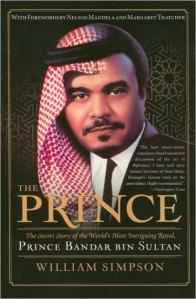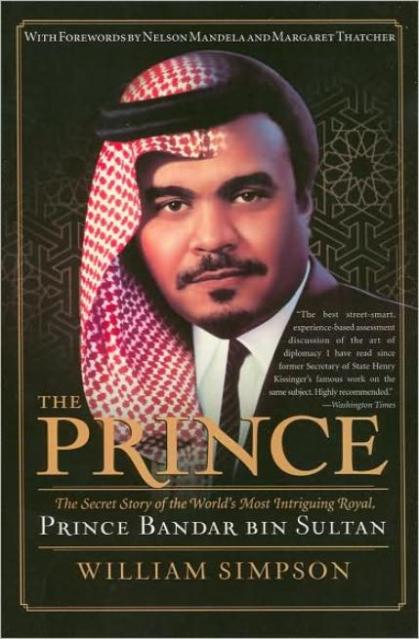The Prince: The Secret Story of the World’s Most Intriguing Royal; Prince Bandar bin Sultan
 The Prince: The Secret Story of the World’s Most Intriguing Royal – Prince Bandar bin Sultan was published by Regan Books, an imprint of HarperCollins in 2006. I have had quite a few reviews, including this interesting appraisal.
The Prince: The Secret Story of the World’s Most Intriguing Royal – Prince Bandar bin Sultan was published by Regan Books, an imprint of HarperCollins in 2006. I have had quite a few reviews, including this interesting appraisal.
Book Review for Maxwell AFB Air & Space Power Journal, Winter 2009.
The Prince:
The Secret Story of the World’s Most Intriguing Royal, Prince Bandar bin Sultan
by William Simpson
I must begin this review by admitting that I am not an avid reader of biographies. So I did not relish the task of reviewing the almost-500-page book The Prince. However, William Simpson’s biography of Saudi prince Bandar bin Sultan soon forced me to revise my opinion. The book was both readable and highly informative, tracing the life of a man who has been at the center of world affairs for three decades.
The Prince chronicles the life of Bandar through his various roles at the nexus of American and Saudi political life. Beginning when he was a fighter pilot, the book notes that the Saudi government tapped Bandar to facilitate sensitive arms negotiations between the United States and Saudi Arabia. This led him into a life of politics and intrigue during which he served in numerous capacities over the years.
These high-profile roles included acting as a lead negotiator to end the war in Lebanon in 1982 and the Iran-Iraq War in 1988. He was also the “bagman” for the Iran-Contra deal, transferring American money to the Iranians during this controversial episode in American history. He was a decisive factor in convincing Soviet premier Mikhail Gorbachev to withdraw from Afghanistan, a key player in bringing allied forces to Saudi Arabia to repel Saddam Hussein after the first Gulf War, and an instrumental architect of the 1991 Israeli-Palestinian peace summit in Madrid. Bandar’s relevance continues into today’s politics.
He served as a tireless advocate of his embattled country in the court of American public opinion after the terrorist attacks on 11 September 2001. And his credible skepticism of Saddam Hussein in the run-up to the Iraq war in 2003 helped the administration of George W. Bush make the fateful decision to enter Iraq to find elusive weapons of mass destruction.
In essence, Bandar’s place at the center of world events makes this biography also a history of the modern Middle East.
Forewords by Nelson Mandela and Margaret Thatcher reveal the book’s gravitas.
I was surprised to discover the close relationship between Mandela and the Saudi prince. Mandela—or Madiba, as he is affectionately nicknamed—remarried on his 80th birthday in 1998, inviting family and only a handful of friends, including the prince.
The author was also able to secure interviews with such power players as former secretaries of state Colin Powell and Henry Kissinger, and part of what makes the book so interesting is to see how Bandar interacted with these players over the years.
First meeting Secretary Powell when he served as an attaché years before, Prince Bandar would later interact with him when Powell was the US Army chief of staff during the 1991 Persian Gulf War and the secretary of state at the beginning of this decade.
Similarly, the Bush family’s giving him the nickname “Bandar Bush”—signifying his status as an adopted relative—and George H. W. Bush’s frequent fishing trips with the prince have no doubt helped fuel conspiracy theories about the Bush family’s connections to the Saudis. One thing that clearly emerges from the book is the respect that Prince Bandar has for the senior President Bush. The former president’s character and kindness come through in many anecdotes related by the prince.
My main criticism of the work has to do with one of the main failings of the genre: a tendency to identify with and defer to the subject of the biography. William Simpson was Bandar’s classmate in military training in the United Kingdom, and the two have remained friends for years. Although this review makes clear that I am impressed with the prince’s credentials and accomplishments, Simpson’s portrayal seems to assign an almost uncritical preference for Bandar’s perspective and policy agenda.
Nonetheless, The Prince is well written and well researched—and currently the only biography of Bandar. Military professionals and members of the national security community will find it a worthwhile read, especially given the conflicts of our time.
Matthew J. Morgan
Atlanta, Georgia

